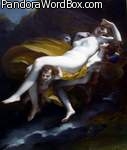|
×  Get the Point! PAIN – WOMAN – UKRAINE – PUTIN MOTHER – SISTER – SPOUSE – MOTHER RUSSIAN WAR – HOLOCAUST – GENOCIDE |
PSYCHE PSYCHOLOGY PSYCHIATRY
Idiom Idea Idiot
Anima Animal
Soul Spirit Alma
All human souls aspire to love and immortality, as personified by Psyche. Lucius Apuleius, the author of the "Golden Ass", was inspired by ancient artistic depictions of Psyche as a beautiful tender maiden with delicate butterfly wings. His story of Eros and Psyche is about how his love for her rescued him from the hell of unrelenting erotism and cupidity. Perhaps, in return, Cupid rescued Psyche from hell or Hades.
Venus, the adoptive mother of Cupid, rejected Psyche but later relented, and Psyche was granted immortality. Since Apuleius, other poets perpetuated the idea that love cures lust and that profound love transcends death. Further ideas in "love" and "mind" are given in other illustrated overviews, but it is relevant to point out here that Plato stressed that "Amor like Dementia is a Powerful God".
Regarding the "soul", the Greeks stressed that it included AIDOS or a sense of "self shame" - thus that it was the restrain against manifesting pride or being immoral. The Greeks also stressed that those mortals who were mentally retarded or insane had no sense of AIDOS and that the Gods declared them to be innocent. Regarding the rest of the mortals who defied AIDOS, the Gods prosecuted and ordered Psychopompos to guide their souls to Hades or hell. Incidentally, in Ukrainian those mortals transgressing AIDOS commit "had" or "harm" and deserve to go to HADES or hell.It is self-evident that our conscience reminds us that reason and desires rarely are in perfect harmony. The psychological "tone" or "background feelings", or personality color the sensitivity and reactions of our psyche. Common terms such as "tired", "bored", "excited", "confused", "optimist", or "pessimist" describe psychological overtones.
It is self evident that most people are limited regarding notions or sound opinions, or, to put it another way, have no IDEA about most of what goes on. In this sense, most people are IDIOTS, which means "no idea". The Greek root IDEIN is for "to see" and does suggest that, in fact, everybody is an IDIOT regarding some subject or another. Because the OPTics of OPTimists may help forming visions or ideas, perhaps, IDIOsyncratic OPTimists may also have healthier IDEAS about life and living.

















